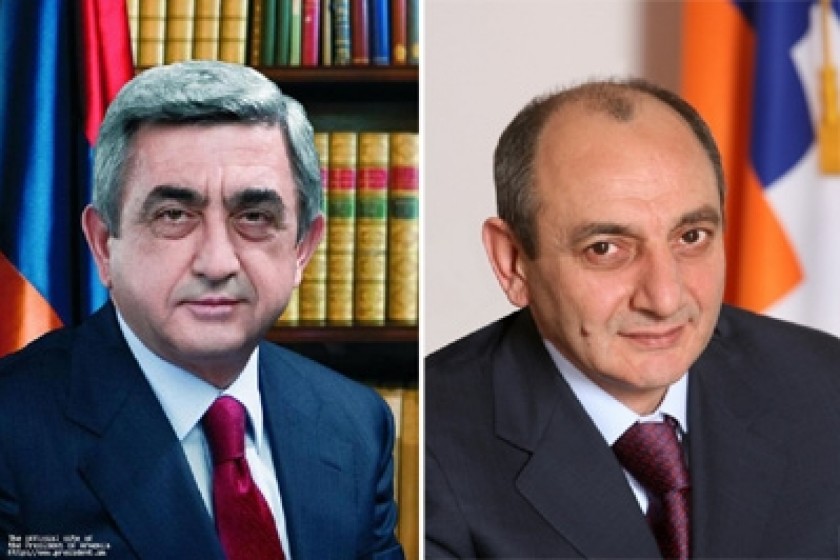
Gandzasar Wall Resurfacing Renews: Artsakh and Armenia Officials Appear Indifferent
Work to resurface the walls of the 13th century Armenian monastery of Gandzasar in Artsakh has begun anew, again raising the unanswered question as to who is in charge of supervising the country’s historical inheritance.
The so-called beautification project is being financed by Russian-Armenian businessman Levon Hayrapetyan.
In the summer of 2011, concerned citizens and specialists alike raised an uproar regarding the resurfacing. This led to the RA Ministry of Culture and the Artsakh Department of Tourism stepping in and halting the project.
Artsakh President Bako Sahakyan and Artsakh Armenian Church Primate Parkev Martirosyan even visited the site to see what all the fuss was about.
But it seems that no one can stop Hayrapetyan from fulfilling his perceived mission to beautify the historic site.
Manoushak Titanyan, a member of the Association of Architects and Restorers of Historical Monuments (AARHM) and a member of the RA Association of Architects, doesn’t mince words when it comes to describing what is going on at Gandzasar.
“…Such goodwill has no regard for either the government or society. The benefactor has decided on principle to resurface the monastery in order to establish his supremacy regarding the two Armenian governments that agreed to halt the fiasco.”
 |
| Gandzasar walls after the resurfacing in the summer of 2011 |
On December 6, the AARHM wrote to President Sargsyan of Armenia and President Sahakyan of Artsakh, expressing the hope that they would intervene and put a stop to the work. The specialist reminded the two leaders that Gandzasar was a site of international significance and that the issue should be dealt with accordingly, both on a professional level and legally.
To find out the opinion of President Sargsyan on the matter, I telephoned his public affairs office, Meri Haroutyunyan, who heads the office, said it was a matter for the president’s press secretary to comment on. So I called President Sargsyan’s Press Secretary Armen Arzoumanyan. When I called in the morning, I was told that Arzoumanyan was out. I called another four times throughout the day. Nobody answered the phone.
I also telephoned the press office of Artsakh President Sahakyan. They advised me to call the department that deals with the preservation of historical monuments.
On December 7, 10 and 11, I made several calls to Sergey Shahverdyan, who heads the Artsakh Department of Tourism and Preservation of Historical Sites. He never answered my calls to his cell phone. My three calls to the department itself on December 11 also went unanswered.
I simply wanted to know if Shahverdyan’s office had granted permission for the resurfacing work at Gandzasar or it was Levon Hayrapetyan’s personal initiative.
On December 7, almost two weeks after the work had recommenced, Hetq got a call from Deacon Samvel Mkrtchyan who coordinates the Religious Board for the Artsakh Diocese’s Youth Organizations.
| Gandzasar walls before the resurfacing |
Deacon Samvel said that Primate Martirosyan might not be aware of the work going on at Gandzasar since he had travelled to the United States and later Yerevan.
Another official, Armen Abroyan, who heads the RA Agency to Preserve Historical and Cultural Monuments, today told me that he was personally against the resurfacing. Abroyan added that Deputy Minister of Culture Arev Samuelyan had taken a personal interest in the matter but that she was presently out of the country and would return in two days.
Abroyan confessed that the ministry’s hands were tied regarding a resolution. “While Artsakh is our country and its problems our problems, any decision to halt the work falls under the jurisdiction of Artsakh.”
The Agency also advised me to get in touch with Slava Sargsyan, who works at the NKR Monuments Preservation Division. But we had already spoken to Sargsyan, who told me he was sick and hadn’t been able to visit Gandzasar. Since he hadn’t seen the monastery walls, Sargsyan said he couldn’t comment.
On July 6, 2011, Levon Hayrapetyan told the “We Will Not Remain Silent” youth activist group that the walls of Gandzasar Monastery were built in the 1980s and not the 13th century. He argued that the walls were falling down and in need of repair. He stated that the tiles being used were from the same quarry as the stones used to build the monastery.
| Gandzasar walls before the resurfacing |
Hayrapetyan’s claim that the walls dated from the 1980s was refuted by specialists in the field. Samvel Karapetyan, who heads the Research on Armenian Architecture NGO called the retiling of the walls a “crime” and “ignorant patriotism”.
Architect Souren Melik-Karamyan, who serves as the Deputy Secretary of the AARHM, expressed a similar opinion to Hetq today.
“I’m opposed to it and I condemn it. You can’t do such a thing to a medieval edifice, to turn it into some holiday showcase with lights and ornaments. I’ll tell Levon Hayrapetyan the same thing.”
Melik-Karamyan is concerned that after Gandzasar, other monuments will fall victim to the whims of other rich “benefactors”. Karamyan says it’s hypocritical for Armenians to complain that others are defiling our historical monuments when Armenians are quite willing to do the damage themselves.
Manoushak Titanyan says that the Gandzasar incident merely proves that Armenians are incapable of preserving and protecting the nation’s historical and cultural legacy.
“Neither is the government interested in such a mission and, sadly, neither is the clergy,” writes Titanyan. “Today we again stand in front of a broken washtub where faceless and foreign-loving benefactors wash their dirty laundry,” Titanyan writes.
 Videos
Videos Photos
Photos
Comments (1)
Write a comment